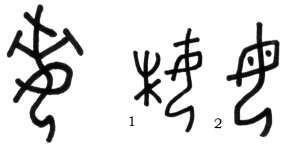I Ching, Yijing or Zhou Yi
"Oracle of the moon": © 2000 LiSe
 Yi Jing, Oracle of the Moon
Yi Jing, Oracle of the Moon

Back to index 'Origins of characters'
Counseling and divining
 Hui and Zhen
Hui and Zhen 
The trigrams of a hexagram are called the lower or inner trigram, and the upper or outer trigram. In Chinese they bear the names ZHEN (divination) and HUI (repentance).

Hui is a picture of a mother (a woman with breasts) and something on her head, like branches coming out of it, or according to Wang Hongyuan a feather headdress (left part of picture in title). She is the teacher, the one who says no, most of the characters with this mother in it have meanings like regret, trouble, to improve, to correct, dark and such. Meaning on oracle bones: clouded sky, dark weather. It is the character Mei2.
Mei, together with Pu, a picture of a crack with a side-crack, indicates the upper trigram, HUI. It is the 'outside', the reason for counseling because you need information about it.
The peculiar thing about HUI in 'regret disappears' is that it figures like this only in the hexagrams 31 to 64, but in more places than the other uses of regret.
Harmen Mesker about this character

Zhen is a cauldron, a Ding, the same one as the name of hexagram 50, with (later) at the top a 'pu' added. Pu is the crack in the oracle-bone, the diviner, the act of divination or its answer, to predict. It is a drawing of the crack, caused by the heat.
Later: always, every, fertile, rich, plural. Mei3: beautiful. With the radical words or speak: plan (of the ancients, which has to be done), warning, teach.
X
X
X
X